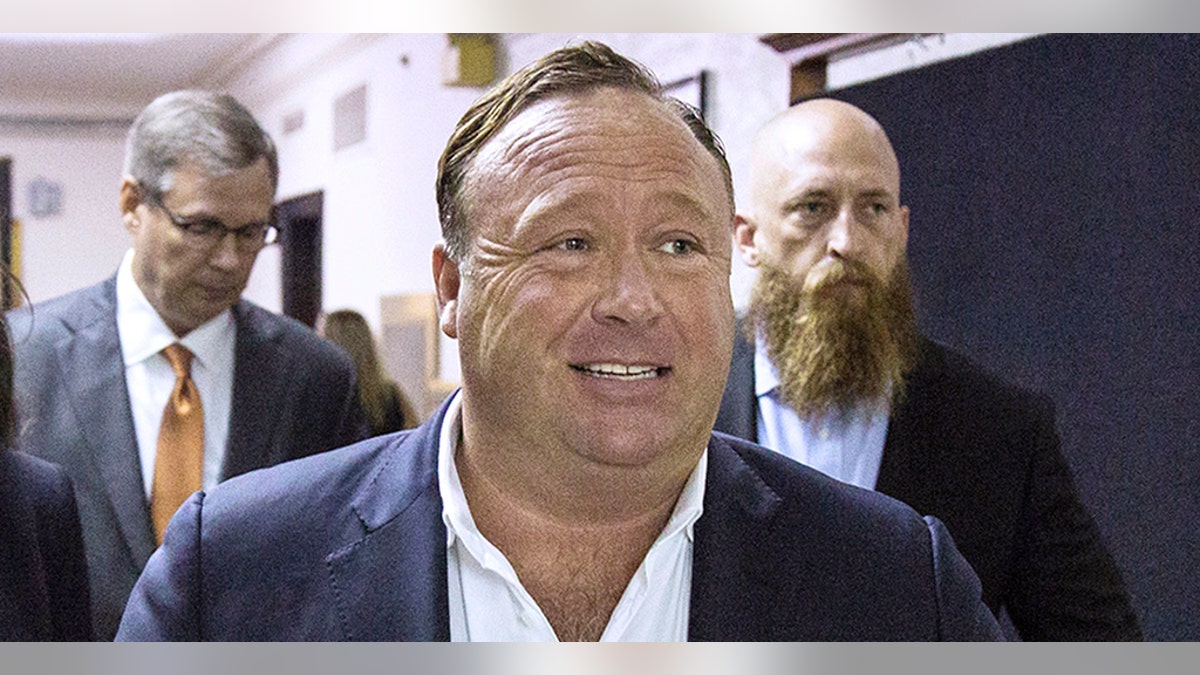
Twitter announced Thursday that it “permanently suspended” Alex Jones, center, and his show InfoWars from their platform, as well as Periscope. (AP)
After years of deflection and foot-dragging, the major tech companies are finally having to take steps toward policing their own content.
They have reached this point kicking and screaming, under great public pressure, after clinging for years to the fiction that they are just public utilities and that people can use their pipes for pretty much anything.
But now they have united, for a brief moment at least, against a major conspiracy theorist.
Facebook, Apple, YouTube and Spotify have all taken action against Alex Jones.
They are deathly afraid of being accused of political bias, sometimes for good reason. Both Facebook and Twitter have both grappled with incidents of discrimination against conservatives, which may have made them gun-shy about banning (as opposed to shadow-banning) some folks.
But almost in unison, the tech giants teamed up against Jones, who runs Infowars.
Candidate Donald Trump appeared on Jones' online show in 2015, and yesterday Jones tweeted a video defense with the headline: "EMERGENCY: President Trump Must Defend the First Amendment."
Facebook said it has taken down some Jones pages "for glorifying violence, which violates our graphic violence policy, and using dehumanizing language to describe people who are transgender, Muslims and immigrants, which violates our hate speech policies."
Apple said it removed the "Alex Jones Show" and other podcasts from iTunes and its podcast app. The company said it "does not tolerate hate speech, and we have clear guidelines that creators and developers must follow to ensure we provide a safe environment for all of our users."
Google’s YouTube dropped the ax on Jones' channel, telling The Washington Post that it terminates users who violate "our policies against hate speech and harassment or our terms prohibiting circumvention of our enforcement measures."
And Spotify banned Jones altogether after earlier removing some podcasts, telling the Post: "We take reports of hate content seriously and review any podcast episode or song that is flagged by our community."
I know Jones has a lot of fans—remember the controversy swirling around his interview with Megyn Kelly—but he's also a guy being sued by Sandy Hook parents for saying that the horrible massacre at that Connecticut school was a hoax.
Jones apologized last year, in careful language, for spreading the phony Pizzagate conspiracy theory, saying he'd been given inaccurate information.
That’s not "conservative." That's at odds with reality.
Jones texted the Post that being banned by the tech companies was "a counter-strike against the global awakening."
"We've seen a giant yellow journalism campaign with thousands and thousands of articles for weeks, for months misrepresenting what I've said and done to set the precedent to de-platform me before Big Tech and the Democratic Party as well as some Republican establishment types move against the First Amendment in this country as we know it," he said.
Separately, Jones called The New York Times a "globalist intelligence agency" and said that the "evil, wicked sociopaths" who work for major media outlets were teaming up to take down Infowars.
I confess I'd like to know how the four tech companies happened to take action on the same day. Perhaps they concluded there was safety in numbers. They seemed to have an ally in Drudge, whose banner headline was "APPLE REGULATES HATE."
But this is just a skirmish. Just recently, Mark Zuckerberg got himself into trouble by saying he saw no reason to ban pages by Holocaust deniers.
There is a fine line between banning hate and bullying on one hand and censoring controversial political opinions on the other. These battles will play out in a hyperpartisan political atmosphere. But for now, Apple, Facebook, Google and Spotify have all agreed there is one person who falls on the wrong side of that line.












































